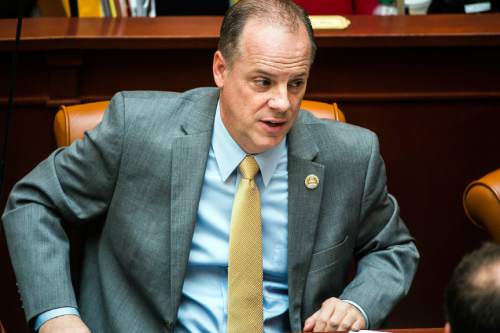This is an archived article that was published on sltrib.com in 2016, and information in the article may be outdated. It is provided only for personal research purposes and may not be reprinted.
Last year, voters killed Proposition 1 in Salt Lake and Utah counties because, while many supported increasing sales tax for local roads, a significant number opposed carving out part of the extra revenue for the sometimes-controversial Utah Transit Authority.
Now, state Rep. Brian Greene, R-Pleasant Grove, is seeking a change that some voters wanted: raising sales tax for roads without requiring that a large share be given to UTA.
He introduced HB215, which he says would keep intact a law that passed last year, HB350, to allow Prop 1. But his bill would provide another alternative, too.
Like Prop 1, Greene's alternative would allow raising sales tax by a quarter-cent per $1 in purchases for transportation. But unlike Prop 1, the legislation would allow giving 20 percent of the money to counties and 80 percent to cities. Cities could spend up to 40 percent of their share on transit, but they also could decide to spend it all on roads.
The law that allowed Prop 1 required counties with transit districts to give 40 percent of the total increase to transit, and the rest would go to counties and cities.
Greene said that when voters in Salt Lake and Utah counties rejected Prop 1 in November, "They said we back greater needs and priorities for the revenue than to allow UTA to take 40 percent of it."
He added, "There's a place for transit, but it's not the greatest need. Our B and C roads [for cities and counties] are a higher priority in Utah County."
Greene said he promised voters he would seek such a change if they would reject Prop 1.
But HB215 likely faces steep challenges.
House Speaker Greg Hughes, R-Draper, a former chairman of the UTA board, last year insisted that transportation tax increases for cities, counties and the UTA move forward together to ensure all needs are handled in a comprehensive way. They were welded together in HB362.
Abby Albrecht, campaign director for the pro-Prop 1 Utahns for Responsible Transportation Investment, said her group and allied business associations stand by HB362 as passed last year.
"HB362 was the grand compromise [among] cities, counties and the transit district. We stand behind that. We stand behind multimodal transportation," she said.
If counties and cities "decide that a new direction is needed, then we would evaluate that."
UTA spokesman Remi Barron said his agency similarly supports HB362 as passed last year.
But Senate President Wayne Niederhauser said "a lot of variations of" the proposal by Greene "could potentially pass" in his chamber.
But he doubts senators will address the issue "until we see whether it passes in the House."
Meanwhile, Barron said UTA is "working closely with the counties that have already passed Prop 1" — Davis, Weber and Tooele counties in the transit district — "to develop a service plan with the additional revenue, and we are excited to start rolling out service in these areas later this year."
While UTA was heavily criticized in previous audits for high executive wages and bonuses, extensive international travel and sweetheart deals with developers, it has been trying to polish its image and make changes.
UTA took out full-page ads last Sunday in Salt Lake City newspapers talking about its plans for improvement and reforms, and also is discussing them online. That can be found at rideuta.com/trust.



